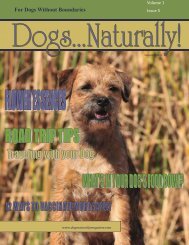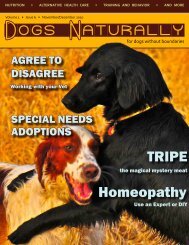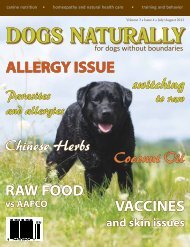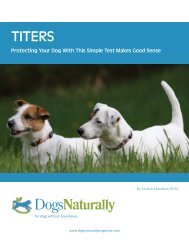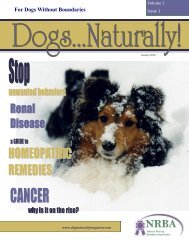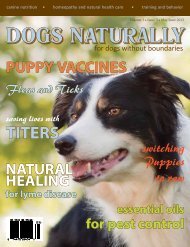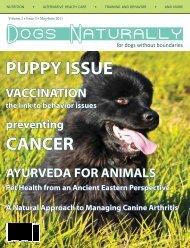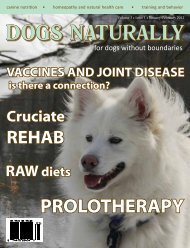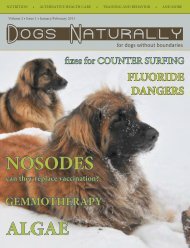July/August 2010 - Dogs Naturally Magazine
July/August 2010 - Dogs Naturally Magazine
July/August 2010 - Dogs Naturally Magazine
Create successful ePaper yourself
Turn your PDF publications into a flip-book with our unique Google optimized e-Paper software.
Regard it as just as desirable to build a chicken house as to<br />
build a cathedral. ~Frank Lloyd Wright<br />
Factory farmed chickens fare no better than cows . Millions of<br />
tons of meat and bone meal from post-slaughter animal waste<br />
are recycled back into animal feed each year, and poultry and<br />
hog producers are the main purchasers of these products. On<br />
industrial poultry farms, a range of antibiotics and additives<br />
are also added to the birds’ feed and water and are necessary<br />
to combat the ill effects of poor quality feed and lack of sunshine<br />
and fresh air. Factory farmed chickens are regularly fed<br />
arsenic (and sometimes turkeys and pigs) to encourage weight<br />
gain and create the appearance of healthy color in the meat.<br />
If the chicken is eating arsenic, your dog is eating arsenic and<br />
the insidious effect of this low level exposure mimics many<br />
chronic diseases. Arsenic exposure leads to cancer, nerve<br />
damage, diabetes and cognitive dysfunction. Like e-coli, arsenic<br />
is not only found in the meat but in the feces which eventually<br />
pollute surrounding water supplies.<br />
The Dark Side Of The Other White Meat<br />
According to the Sustainable table, “In some states, garbage<br />
can legally be fed to pigs, and if this garbage includes rotten<br />
meat, pigs are at risk for diseases such as hog cholera, Foot<br />
and Mouth Disease, African swine fever, and swine vesicular<br />
disease. Other pathogens of concern are Salmonella, Campylobacter,<br />
Trichinella, and Toxoplasma. These diseases may<br />
be spread to other livestock or humans if hogs eat contaminated<br />
meat in improperly treated food waste.<br />
Pigs have a completely different digestive system than cows<br />
and unlike cows, can digest soil and dirt. As a matter of fact<br />
most pigs can get 80% of their daily food ration from soil<br />
alone. They eat grasses, legumes, ground cover, standing<br />
plants and are about the easiest animal to raise on pasture<br />
without the worry of supplementation. Unfortunately, this<br />
is not the practice that is employed by large pig operations.<br />
What does this all mean for ourselves and our pets? With-<br />
out the nutrients that are normally found in healthy soil and in<br />
turn the plants that soils contain, our companion animals are<br />
at critical risk for disease and insufficiencies.<br />
If you knew how meat was made, you'd probably lose your<br />
lunch. ~k.d. lang<br />
As much as possible, ensure that your meat comes from local<br />
farmers who raise their animals as naturally as possible. If you<br />
are forced to feed grain-fed animals, then you might want to<br />
supplement a prey-model diet to replace the nutrients erased<br />
by factory farming and to boost your dog‘s immune system to<br />
fight the ill effects from additives such as hormones, antibiotics<br />
and arsenic. Although the full extent of the dog’s ability to<br />
digest plant matter is largely unknown, all of the deficiencies<br />
in vitamins and minerals are readily available in herbs. Unless<br />
you are able to feed exclusively organic, grass-fed animals, the<br />
benefits of feeding plant matter to dogs likely outweighs the<br />
risks of feeding deficient meats which have joined the<br />
alarmingly large and growing list of products contaminated<br />
by increasingly powerful industries.<br />
Erika Phillips is the Editor in Chief of <strong>Dogs</strong> <strong>Naturally</strong> <strong>Magazine</strong><br />
and the proprietor of The Controversial Canine.<br />
She can be reached for consultations in Homeopathy/Herbs/<br />
Behaviour/Nutrition at www.controversialcanine.com<br />
www.dogsnaturallymagazine.com <strong>July</strong>/<strong>August</strong> <strong>2010</strong> | 33



